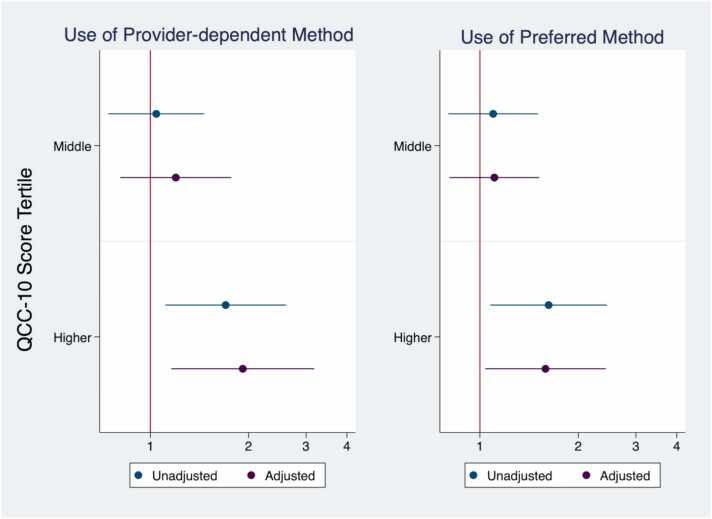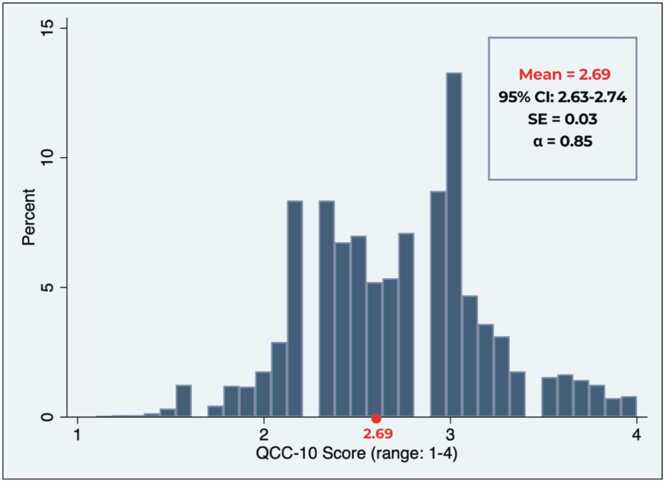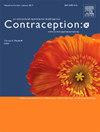在埃塞俄比亚具有全国代表性的妇女样本中,以人为本的避孕咨询和与避孕做法的联系。
Q2 Medicine
引用次数: 0
摘要
目标:估算目前和近期避孕药具使用者接受以人为本的避孕咨询的水平,评估对哪些人提供不同的咨询,并研究咨询与避孕方法(特别是使用依赖于提供者的方法和使用个人偏好的方法)之间的关系:这项横断面研究使用的是埃塞俄比亚 "绩效监测促进行动 "项目在 2021 年 10 月至 11 月期间收集的具有全国代表性的数据,对象是年龄在 15-49 岁之间的现有和近期避孕药具使用者(n = 2731)。描述性分析通过最近验证的避孕咨询质量简易量表(QCC-10)估算了以人为本的咨询水平。二变量和多变量逻辑回归估计了与避孕措施的关联:结果:埃塞俄比亚的避孕者接受的咨询质量一般(QCC-10 平均分 = 2.69,范围:1.1-4.0),在接受以人为本的护理方面存在严重的社会不平等。年龄较小、未受过教育、未同居、来自贫困家庭或在非公立机构使用避孕药具的妇女所接受的以人为本的护理较少。据观察,较高质量的咨询与妇女的避孕措施之间存在密切关系。与接受最低质量咨询的妇女相比,接受最高质量咨询的妇女使用依赖于提供者的避孕方法的几率几乎是后者的两倍(AOR:1.92;95% CI:1.16-3.18)。在目前的使用者中,接受过最高质量咨询的妇女使用其首选方法的几率比接受最差质量护理的妇女高出 62%(95% CI:1.06-2.48):结论:较差的医疗质量与使用非首选方法和依赖医疗服务提供者的方法有关。减少生殖健康差异和促进避孕自主权的努力应优先考虑以人为本的避孕咨询方法:根据个人的社会人口特征(如受教育程度或婚姻状况)提供以人为本的不公平避孕护理,会损害妇女的生殖自主权,并阻碍避孕体验。以人为本的避孕咨询应提供给埃塞俄比亚的所有妇女,无论其背景如何,以支持个人实现其生殖目标。本文章由计算机程序翻译,如有差异,请以英文原文为准。



Person-centered contraceptive counseling and associations with contraceptive practices among a nationally representative sample of women in Ethiopia
Objectives
To estimate levels of person-centered contraceptive counseling among current and recent contraceptive users, assess for whom counseling differs, and examine the relationship between counseling and contraceptive practices, specifically use of provider-dependent methods and use of one’s preferred method, among women in Ethiopia.
Study design
This cross-sectional study uses nationally representative data collected by the Performance Monitoring for Action Ethiopia project among current and recent contraceptive users (n = 2731) aged 15–49 between October and November 2021. Descriptive analyses estimated person-centered counseling levels via the recently validated quality of contraceptive counseling short scale (QCC-10). Bivariable and multivariable logistic regression estimated associations with contraceptive practices.
Results
Contraceptive users in Ethiopia receive moderate quality counseling (mean QCC-10 score = 2.69, range: 1.1–4.0) with significant social inequities in the receipt of person-centered care. Women who are younger, uneducated, not in union, from poorer households, or who sourced their method from a non-public facility reported less person-centered care. Strong relationships were observed between higher quality counseling and women’s contraceptive practices. Those receiving highest quality counseling had nearly double the odds of using provider-dependent methods compared to those reporting lowest quality counseling (AOR: 1.92; 95% CI: 1.16–3.18). Among current users, women reporting highest quality counseling had 62% higher odds of using their preferred method relative to women receiving poorest quality care (95% CI: 1.06–2.48).
Conclusion
Poorer quality care is associated with use of non-preferred methods and reliance on provider-independent methods. Efforts to reduce reproductive health disparities and promote contraceptive autonomy should prioritize a person-centered approach to contraceptive counseling for all.
Implications
Inequitable delivery of person-centered contraceptive care based on individuals’ sociodemographic characteristics, such as education or marital status, undermines women’s reproductive autonomy and hinders contraceptive experiences. Person-centered contraceptive counseling should be provided to all women in Ethiopia, regardless of their background, to support individuals in achieving their reproductive goals.
求助全文
通过发布文献求助,成功后即可免费获取论文全文。
去求助
来源期刊

Contraception: X
Medicine-Obstetrics and Gynecology
CiteScore
5.10
自引率
0.00%
发文量
17
审稿时长
22 weeks
 求助内容:
求助内容: 应助结果提醒方式:
应助结果提醒方式:


